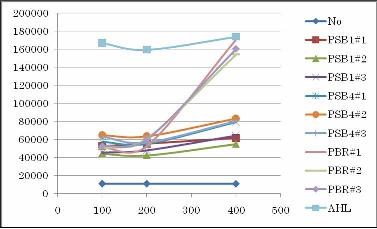Tokyo/Works/Assay
From 2007.igem.org
Works top 0.Hybrid promoter 1.Formulation 2.Assay1 3.Simulation 4.Assay2 5.Future works
1.Important assay
Hill function fitting
新しく作ったハイブリッドプロモーターに関してはデータがないので,実験によりパラメータを求める.
ヒル関数をfittingさせることにより,n2,n3,K2,K3が求まる.
We have obtained data for our newly devised hybrid promoter. By Hill function fitting, we have determined n2, n3, K2, and K3.


導出に関してはfor more detail.
Assays for hybrid promoter
These assays were done
-to determine the characteristics of our hybrid promoter.
The data from here were used for computational analyses and simulations.
Repression and activation check with LacI and AHL
Purpose
check if AHL activates lux-lac hybrid promoter
check if lacI represses lux-lac hybrid promoter
Result & Conclusion
AND gate by AHL & IPTG
Lux-lac hybrid promoter is activated only in the presence of AHL and IPTG.
IPTG assay
Purpose
To determine the order of the concentration of IPTG necessary for the activation of our lux-lac hybrid promoter in the LacI producing pTrc99A cells.
The order of the concentration is used for more detailed assay with narrower range of the IPTG concentration.
Result & Conclusion
Activation check by cell-produced AHL
Purpose
To check if worker E. coli (Sender) can produce enough AHL for our model to work by using different copy numbers of plasmids.
Result & Conclusion
Not only high copy number plasmid pSB1, also low copy number plasmid pSB4 and pBR produced enough AHL to activate the LacI hybrid promoter in other cells. Especially, pBR remarkably produced AHL in the present experiment.
2.Preliminary assays
We conducted preliminary assays to practice experiments and check if the materials and methods worked properly.
See more details
